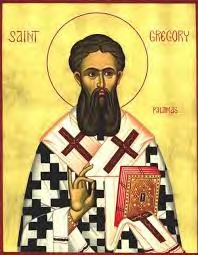 Gregory closes his fourth oration by analyzing the actual titles of the Son. While the being of God “cannot be expressed in words,” Gregory does believe it is possible to “sketch Him by His attributes, and so obtain a certain faint and feeble and partial idea concerning Him. Gregory’s catalogue of 15 divine names and attributes includes the following:
Gregory closes his fourth oration by analyzing the actual titles of the Son. While the being of God “cannot be expressed in words,” Gregory does believe it is possible to “sketch Him by His attributes, and so obtain a certain faint and feeble and partial idea concerning Him. Gregory’s catalogue of 15 divine names and attributes includes the following:
1 He Who Is, and God. Both are “the special names of His essence.
2 Father, Son and Holy Spirit. Within the Godhead itself, “the proper name of the unoriginate is ‘Father,” and that of the unoriginately begotten is ‘Son’, and that of the unbegottenly proceeding or going forth is ‘the Holy Spirit.’ More particularly, the Son is called “Son because He is identical with the Father in essence; and not only for this reason, but also because He is of Him.
3 Only Begotten. When the son is called Only Begotten, both His uniqueness as “the only Son” and “the manner of His Sonship” are in view. This is an incorporeal, eternal and timeless generation, one “not shared by bodies”
4 Word. The Son is called Word in relationship “to the Father as word to mind; not only on account of his passionless generation, but also because of the union, and of his declaratory function.” In a manner of speaking, the Son is the definition or “demonstration of the Father’s nature, as everything that is begotten is a silent word of Him that begot it.”
5 Wisdom. The Son is “the knowledge of things divine and human. For how is it possible that He who made all things should be ignorant of the reasons of what He has made?
I would only present the first five of Gregory’s 15 in this issue of the Bulletin since I would invite you to take time and “think about” each of these five. Each, I know, presents a challenge since they represent the mystery that is our God. All Three Sacred Persons have existed for all eternity. They exist separately but only comprise one Godhead. There is truly a dynamic relationship between the three of them. They each have a specific “role” or “function” to perform and each compliments and completes the other. When did Gregory live? In the fourth century – born in 329 CE. Think about this!
